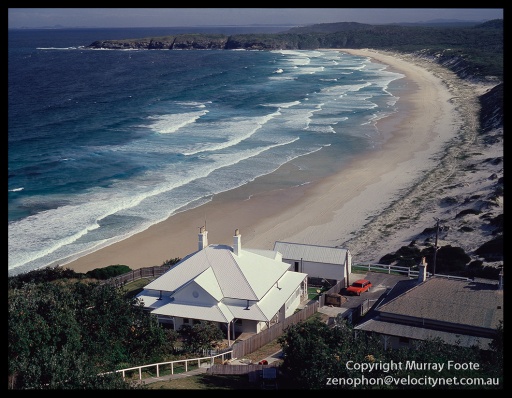This is Seal Rocks, providing an obvious reason to built a lighthouse nearby. It gets its name because it is home to the northernmost colony of Australian fur seals and it is also popular with surfers. This view is not from the Sugarloaf Point Lighthouse, though, but from a viewpoint nearby. Note that the far object in the water, at the right near the horizon, is a ship not a rock.
The building of a lighthouse was recommended here in 1863. At first the favoured location was Seal Rocks but a marine board party in 1873 was unable to land on the rocks and decided to build the lighthouse on nearby Sugarloaf Point instead. The lighthouse was built in 1875.
These images are from the 13th and 14th June 1987.
This is a subsidiary light in the lantern room of the lighthouse, casting a red light out towards Seal Rocks, which you can see through the window. If mariners could see this light they were probably getting too close to the rocks.
Here is a succession of views inside or through the optical system, which was large enough to stand up in.
This one is actually upside-down (because the rocks look the right way up).
Not a bad view for a place to live. The red car might be my rental car, I don’t know.
A similar view with the last rays of the setting sun….
It’s dark now, but with some light from the sunset still in the sky.
This is an eight-hour exposure, during most of which I was asleep. Long exposures on film were complicated by non-linear behaviour of film, so that you had to add extra exposure for reciprocity failure.
The light goes overhead so the fogging around the lighthouse is not merely due to the light; I think it’s probably diffusion of light through sea mist and fog. The line in the sky you can see is a star trail. If you click on the image for a larger view, you can see many more finer ones.
I’ve darkened this to make it look more like a night-time exposure. Night-time exposures can come out as bright as daylight if you want. The colour of the light is the same as daylight too, after all this is close to a full moon and the general lighting is moonlight reflected from the sun. When it’s very dark we perceive the light as blue. That’s because our eyes use rods and cones to detect light and in very low light, just the rods which see a reduced spectrum of colours. It’s not the colour of the light that changes, just our perception of it.
After closing this exposure, probably an hour before dawn, I climbed down the cliff to photograph the sea, cliffs and lighthouse from a rocky vantage point I had identified the previous night. Unfortunately, this 5×4″ slide fell from the clips in the commercial lab to the bottom of their processing tank, where it lay for some time. Only enough was left to show me what might have been. So I cannot show you that image.
Finally, here is the lighthouse in the early morning light. It does not need to be tall because it is on top of a cliff and it is a very fine specimen. It is one of the first lighthouses built by James Barnett, the preeminent lighthouse architect in New South Wales in the nineteenth century.












Pingback: From Dusk Till Dawn | Murray Foote
Fabulous photos… and such an interesting commentary. The seal rocks almost look like seals, don’t they! The warning light pictures are quite extraordinary, Do you ever publish calendars of your photos – they would make wonderful gifts.
LikeLike
Thanks Lois. I suppose they do, I hadn’t really thought about it. Calendars is a good idea that I hadn’t really thought about. I might at some stage also offer ebooks and prints. At the moment, though, I’m preparing for a big photographic trip, this time to Scotland, Lofoten Is, Spitsbergen, Greenland and Iceland.
LikeLike
Great post Murray,
8 hours…… that is a long exposure! reciprocity failure at the extreme.
David.
LikeLike
Thanks David
I remember I was intrigued to see whether it would work and I was getting up before dawn anyway. It’s also the benefit of a secure environment where you know there’s no-one going to go during the night – and a dry environment for that matter, using a large format camera with an open shutter. I composed it in the dark, though, and was disappointed in it the composition at the time though not so much now.
LikeLike
Pingback: Lighthouse Monochromes – New South Wales #2 « Murray Foote